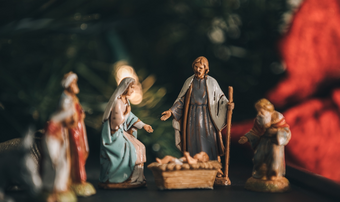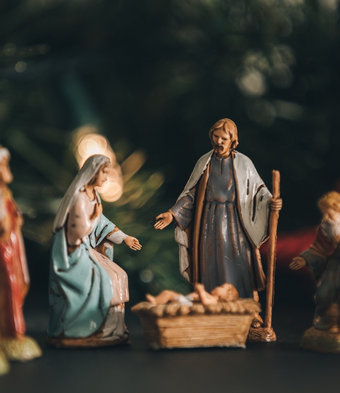How to be hopeful when your mortgage goes up

It’s been called the ‘cruelest tax of them all’. When it goes up, it puts lives at risk and steals jobs and homes from hard working citizens. It eats into savings. Right now, our economy is locked in its powerful grip.
I’m talking, of course, about inflation.
This week the latest inflation figures came out. They contained a nasty shock. The headline is that inflation has stayed put at 8.7%. But dig deeper and you discover that a particular form of what’s called core inflation actually rose to 7.1%. What this suggests is that stubbornly high inflation is here to stay, at least for the medium term. It also casts doubt on the Prime Minister’s ambition to halve inflation, one of his five pledges to the British people.
Now I’m not an economist. I spent a brief while at university grappling with the history of economic theory, but I only took the course because my twin brother was on it. We thought it would be amusing to be in class together again...I’m sure it was amusing for both of us, if not any of our peers or the lecturer!
But you don’t have to be an economist or even have any discernible skills in maths to know that prices have been going up. The cost of a weekly shop is higher. Petrol is costing more. Train travel is costing more. And, yes, rents and mortgages are eating into people’s disposable income.
If you’ve ever wondered what inflation actually is, here’s a layperson’s explanation. Inflation means a general increase in the price of goods and services which, over time, causes an imbalance in the economy and leads to a decrease in the value of money (my thanks to this article on the Gospel Coalition for this definition!).
The bottom line is that inflation makes everyone poorer. Now for some, this is economic pain they’ll be able to absorb. For others, it will mean forgoing holidays and time away so they can keep up with increased rent or mortgage payments. For others, it will mean shopping at Aldi, not Sainsburys. For some, it will mean losing their jobs, their livelihoods and their homes. As with so many things in life, it's the most vulnerable who will suffer the most.
Today, banks were summoned to meet with the Chancellor, Jeremy Hunt, to discuss the recent instability and mortgage rates rise. At this stage, the government has ruled out any financial schemes to help people keep up with mortgage payments. Instead, I suspect banks will be encouraged to be as generous as possible in giving people more time to cover mortgage repayments. I’ve had family and friends impacted by the need to find an extra £200-300 a month.
I always find historical context helpful and I do think it can be useful to remember that we’ve faced serious economic pressures before. In 2008, for example, there was the financial crash which had a major impact on the economy and people’s lives. And as bad as the current situation is, it’s not as dramatic as things got in the 1970s, when interest rates surged to a whopping 17%! Looking at the history of interest rates, it’s noticeable that historically, they’ve been much higher and the long, sustained period of comparatively low interest rates we’ve seen since 2000 was never going to last forever.
That being said, there’s no solution to high inflation that doesn’t involve a lot of pain. And some of the pain is being delayed because of the high number of fixed-rates mortgages, which means many people will be re-negotiating in the coming months. In its Monetary Policy Report, the Bank of England has noted that ‘the greater share of fixed-rate mortgages means the full impact of the increase in Bank Rate to date will not be felt for some time.’
This means in six months time, even if the situation has improved somewhat, people will still be feeling the impact of this week’s rates rise.
So how might we respond as Christians?
1. Firstly, it’s always striking to me that the most common command in the Bible is: do not fear. It comes up again and again. It’s a command that applies no matter what our circumstances. Humanly speaking, it’s often very hard to obey. But the more I keep God’s character in view, the more I am able to believe it. After all, God is a faithful provider. We can choose to trust Him, even while we face difficult spending decisions because of inflation and interest rate rises. Good times and times of plenty make trusting God easier. But we learn more and our muscles of faith are tested and grown when things are more difficult.
This is the principle the Apostle Peter teaches us in 1 Peter 1:7. Speaking of various trials, he tells the believers: “these have come so that the proven genuineness of your faith – of greater worth than gold which perishes even though refined by fire – may result in praise, glory and honour when Jesus Christ is revealed.”
2. The biblical teaching on generous giving applies as much during times of inflation as it does during times of economic boom. Arguably, this is an even more important principle. It would be easy to pull up the drawbridge and keep as much of our income to ourselves as possible. I’m speaking here about anyone who can absorb higher prices and continue to afford their existing lifestyle. If God has blessed you in such a way, then it’s right to ask: what more can you give to support those who have less? It’s an amazing opportunity for God’s people to demonstrate sacrificial, costly generosity at a time when our natural instincts might be to keep more back for ourselves.
3. I do wonder if there’s some wisdom to be gleaned from the Old Testament: I’m thinking of laws God gave Israel to do with money, lending, borrowing, interest and so on. One of the principles we’re to draw from these commands is the importance of mercy towards those who fall on hard times. It can be easy to say this is the government’s responsibility. But should we ask what we can do? Who are the needy in our own congregations who will need help in the coming months and years? Is there anything we can do to help them at their point of need? Perhaps your church has a benevolent fund already, but if not, why not set one up?
4. Rising inflation which is largely the result of external factors is a serious reminder that human beings are not in control. It’s no bad thing for the government to say it wants to bring down inflation. But the reality is that in some senses, it’s beyond its control. For example, the government couldn’t stop the war in Ukraine which sent the price of energy skyrocketing. We must humbly recognise the limits of human ability.
5. I believe God’s providence extends to all aspects of life. We believe in a God who is involved in His world. According to the Westminster Confession of Faith, God’s providence is His upholding and governing of every creature and every action. Rising inflation and the corresponding economic impact is not outside God’s control. There surely is some comfort knowing this. If God is good – and He is! – then we can trust His good purposes, however mysterious they may appear to us.
6. I think we should pray that inflation will be brought under control. We do so on behalf of the most vulnerable in our communities. Inflation will have the biggest impact on the millions of people around the UK who are living in poverty. To use biblical categories, it’s the poor, the orphans, the widows and the strangers who will struggle the most. We can pray in light of God’s heart for the most vulnerable that, somehow, inflation will slow down over the upcoming months.
7. Finally, we remember that all good gifts come from God. Maybe this is a time for being more thankful to God for what we have and remembering we’re called to be stewards of these good gifts. If you have plenty, give thanks! If you have little, give thanks! Above all, we can trust our Heavenly Father. That’s what Jesus taught us when he said even the flowers of the field are crowned with splendour. If God clothes the flowers, how much more will He provide for His own, precious children?
“And why do you worry about clothes? See how the flowers of the field grow. They do not labor or spin. Yet I tell you that not even Solomon in all his splendor was dressed like one of these. If that is how God clothes the grass of the field, which is here today and tomorrow is thrown into the fire, will he not much more clothe you—you of little faith? So do not worry, saying, ‘What shall we eat?’ or ‘What shall we drink?’ or ‘What shall we wear?’ For the pagans run after all these things, and your heavenly Father knows that you need them. But seek first his kingdom and his righteousness, and all these things will be given to you as well. Therefore do not worry about tomorrow, for tomorrow will worry about itself. Each day has enough trouble of its own.”






